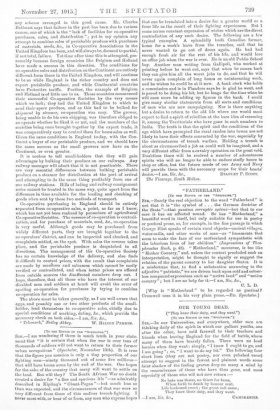" FATHERLAND."
[To TRII EDITOR 01 osrscrierea."] Sia,—Surely the real objection to the word "Fatherland" is not that it is " the symbol of . . . the German doctrine of the State "—that pessinta corruptio optimi—but that to our ears it has an affected sound. So has " Motherland," a beautiful word in itself, but only suitable for use in poetry or poetical prose, as, for example, in the fine passage in which George Eliot speaks of certain rural objects—ancient villages, water-mills, and other works of man—as "lineaments that seem to make the face of our motherland sympathetic with the laborious lives of her children" (Impressions of Theo- phrastus Such, p. 48). " Motherland," moreover, is too like " Mother Country," and, unless the context precluded such an interpretation, might be thought to signify or suggest the relation of the parent country to her daughter States. It is a misfortune that, to find a substantive answering to the adjective " patriotic," we are driven back upon cold and colour- less compound expressions such as "native land" and "native
country" ; but I see no help for am, Sir, &c., C. L D.
[Why is " Motherland " to be regarded as poetical P Cromwell uses it in his very plain prose.—En. Spectator.]






































 Previous page
Previous page